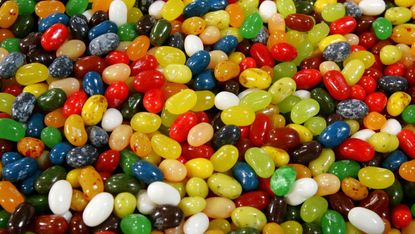Sweet tooth: How sugar became the world's drug of choice
Eating too much sugar can have devastating side effects for its hundreds of millions of 'addicts'

Reaching out for a biscuit or a piece of chocolate to satisfy a craving for 'something sweet' can seem like the most natural thing in the world, but is our love of all things sugary a dangerous addiction rather than an innocent pleasure?
In a lengthy article in The Guardian that's already causing a stir on social media, Gary Taubes makes the case that sugar is ultimately the most destructive drug of all, with eye-opening long-term implications for global health.
Is sugar addictive?
Subscribe to The Week
Escape your echo chamber. Get the facts behind the news, plus analysis from multiple perspectives.

Sign up for The Week's Free Newsletters
From our morning news briefing to a weekly Good News Newsletter, get the best of The Week delivered directly to your inbox.
From our morning news briefing to a weekly Good News Newsletter, get the best of The Week delivered directly to your inbox.
Historically, Taubes says, "the response of entire populations to sugar has been effectively identical to that of children: once people are exposed, they consume as much sugar as they can easily procure."
Like alcohol, tobacco and 'hard drugs', sugar stimulates the brain to release the 'pleasure chemical' dopamine – but the similarities do not end there.
A recent study by the Queensland University of Technology found that dopamine bursts caused by sugar begin to drop off with long-term consumption, The Independent reports.
As less dopamine is released, "people need to consume higher and higher levels of sugar in order to reach the same reward levels and avoid mild states of depression", the same process observed in alcoholics and drug addicts.
However, the research is far from definitive. A 2014 study at Edinburgh University concluded that there was no evidence that the body could become physically dependent on sugar, and that excessive consumption of sugar was a behavioural disorder, similar to a gambling addiction.
Ethical considerations mean that scientists cannot measure how sugar addiction compares to other drugs in an experiment on human subjects. However, a 2013 study conducted on laboratory rats concluded that sugar "can not only [be a] substitute for addictive drugs, like cocaine, but can even be more rewarding and attractive".
Researchers suggest that this seemingly harmful drive for sweet foods could be linked to "evolutionary pressures for seeking and taking foods high in sugar and calories".
How dangerous is sugar?
Whether or not a sweet tooth should be treated like a drug habit, sugar is linked to an array of health issues which spell trouble for its hundreds of millions of 'addicts'.
The most obvious of these is obesity, but people who eat higher amounts of sweet food also have a higher propensity to develop serious medical conditions such as type 2 diabetes, high blood pressure and high blood sugar.
Nutritionists and health authorities have long recommended that sugar only be consumed in moderation, but, as Taubes argues, the long-term implications of our high-sugar diets are only just beginning to be understood.
"If it takes years or decades, or even generations, for us to get to the point where we display symptoms of metabolic syndrome," he writes. "It's quite possible that even these apparently moderate amounts of sugar will turn out to be too much."
Create an account with the same email registered to your subscription to unlock access.
Sign up for Today's Best Articles in your inbox
A free daily email with the biggest news stories of the day – and the best features from TheWeek.com
-
 Antony Gormley's Time Horizon – a 'judgmental army' of 100 cast-iron men
Antony Gormley's Time Horizon – a 'judgmental army' of 100 cast-iron menThe Week Recommends Sculptures are 'everymen questioning the privilege of their surroundings' at the Norfolk stately home
By Adrienne Wyper, The Week UK Published
-
 'King's horses take free rein through London'
'King's horses take free rein through London'Today's Newspapers A roundup of the headlines from the US front pages
By The Week Staff Published
-
 Is pop music now too reliant on gossip?
Is pop music now too reliant on gossip?Talking Point Taylor Swift's new album has prompted a flurry of speculation over who she is referring to in her songs
By Richard Windsor, The Week UK Published
-
 Nigeria's worsening rate of maternal mortality
Nigeria's worsening rate of maternal mortalityUnder the radar Economic crisis is making hospitals unaffordable, with women increasingly not receiving the care they need
By Harriet Marsden, The Week UK Published
-
 Dengue hits the Americas hard and early
Dengue hits the Americas hard and earlySpeed Read Puerto Rico has declared an epidemic as dengue cases surge
By Peter Weber, The Week US Published
-
 How happy is Finland really?
How happy is Finland really?Today's Big Question Nordic nation tops global happiness survey for seventh year in a row with 'focus on contentment over joy'
By Harriet Marsden, The Week UK Published
-
 How Tehran became the world's nose job capital
How Tehran became the world's nose job capitalUnder the radar Iranian doctors raise alarm over low costs, weak regulation and online influence of 'Western beauty standards'
By Harriet Marsden, The Week UK Published
-
 Africa's renewed battle against female genital mutilation
Africa's renewed battle against female genital mutilationUnder the radar Campaigners call for ban in Sierra Leone after deaths of three girls as coast-to-coast convoy prepares to depart
By Harriet Marsden, The Week UK Published
-
 Argentina: the therapy capital of the world
Argentina: the therapy capital of the worldUnder the radar Buenos Aires natives go hungry to pay for psychoanalysis, amid growing instability, anxiety – and societal acceptance
By Harriet Marsden, The Week UK Published
-
 Does declining birth rate spell doom for Britain?
Does declining birth rate spell doom for Britain?Today's Big Question Ageing population puts pressure on welfare state, economy and fabric of society, while fertility is rising on populist agendas
By Harriet Marsden, The Week UK Published
-
 How a new blood test could revolutionise sepsis diagnosis
How a new blood test could revolutionise sepsis diagnosisThe Explainer Early results from ongoing trial suggest faster identification of deadly condition is possible
By The Week Staff Published